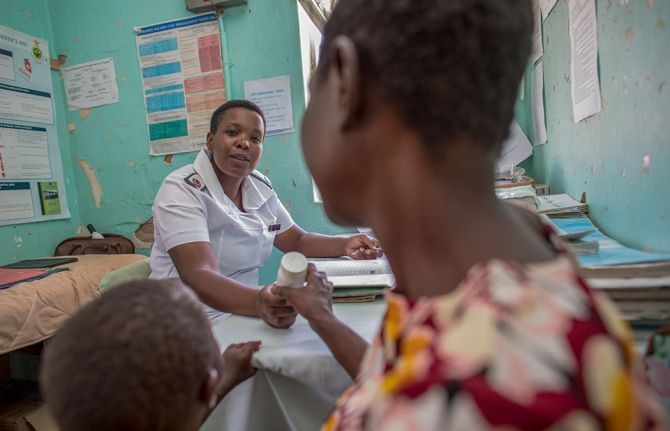

Press Statement
UNAIDS welcomes bold support from the United States of America in response to colliding pandemics
18 March 2021 18 March 2021GENEVA, 18 March 2021—UNAIDS warmly welcomes the passing of the US$ 1.9 trillion American Rescue Plan Act. The historic legislation will deliver much-needed relief in the light of COVID-19, both in the United States of America and around the world.
The bill’s inclusion of nearly US$ 11 billion for global investments in COVID-19 will help to save many lives. The allocation of US$ 250 million for the United States President’s Emergency Plan for AIDS Relief (PEPFAR) and US$ 3.5 billion for the Global Fund to Fight AIDS, Tuberculosis and Malaria (Global Fund) will help to prevent hard-won progress against HIV, tuberculosis and malaria from being reversed.
“The support of the United States for the global response to COVID-19 is highly commendable, particularly as it grapples with the devastating impact of COVID-19 at home,” said Winnie Byanyima, Executive Director of UNAIDS. “With the American Rescue Plan Act the United States proves again its steadfast commitment to the AIDS response and to fighting other global pandemics. We look forward to continuing our strong partnership with the United States in our shared commitment to end AIDS and to overcome COVID-19,” said Ms Byanyima.
Generous bipartisan support from the United States has allowed great strides to be made against the AIDS pandemic. Investments made by the United States over the past 18 years through PEPFAR and the Global Fund have proved transformational—they have prevented millions of HIV infections and saved the lives of millions of people. People living with HIV who are on antiretroviral therapy can now enjoy long, healthy lives and the number of new HIV infections and AIDS-related deaths are on the decline, although the rate of decline is still far too slow.
“Despite the tremendous successes, the work is unfinished. AIDS remains an urgent global health crisis,” said Ms Byanyima.
Global averages conceal the reality that too many people are still being left behind. The world did not reach the 2020 Fast-Track prevention and treatment targets committed to in the UNAIDS 2016–2021 Strategy and the United Nations Political Declaration on Ending AIDS. Many countries and communities are not currently on track to end AIDS by 2030.
While 26 million of the 38 million people living with HIV are accessing life-saving treatment, which doubles as prevention by stopping the spread of the virus, another 12 million remain without. The rate of new HIV infections, especially for adolescent girls and young women in sub-Saharan Africa and members of key populations, remains high. In 2019, a further 1.7 million people worldwide were newly infected with HIV and 690 000 people died of AIDS-related illnesses. The rate of new HIV infections and deaths, especially among the hardest to reach populations, means that continued success requires greater effort, focus and commitments. This is doubly true as COVID-19’s impact puts added pressure on the HIV response.
“The global response to AIDS was off track prior to COVID-19. Unchecked, COVID-19 threatens to reverse valuable progress made against HIV. This confluence of pandemics requires an acceleration of efforts to close the gaps in HIV testing, prevention and treatment while working to stop COVID-19’s spread,” said Ms Byanyima. “Identifying where, why and for whom the HIV response could be improved has illuminated the inequalities, within and between countries, that contribute to the spread of HIV. The stark contrast of success in some places and among some groups of people and the failure in others confirms that HIV remains a pandemic of inequalities. That is why the new global AIDS strategy 2021–2026 contains new targets to help us reach those who are being left behind.”
Fortunately, investments in accelerating the HIV response do not come at the expense of the COVID-19 response, but rather support many of its most critical requirements. Nations combatting COVID-19 are already applying lessons learned from the HIV response, using the systems, human resources, know-how and laboratories built over the past two decades.
Efforts to reinforce and leverage the infrastructure built to end AIDS can optimize the health impact and sustainability of the response to COVID-19. Leveraging the experience of the HIV response offers a unique opportunity to build back better from COVID-19.
“These new investments from the United States in COVID-19 will save many lives in low- and middle-income countries and help strengthen the health systems that deliver care for HIV, COVID-19 and other health emergencies,” added Ms Byanyima.
UNAIDS
The Joint United Nations Programme on HIV/AIDS (UNAIDS) leads and inspires the world to achieve its shared vision of zero new HIV infections, zero discrimination and zero AIDS-related deaths. UNAIDS unites the efforts of 11 UN organizations—UNHCR, UNICEF, WFP, UNDP, UNFPA, UNODC, UN Women, ILO, UNESCO, WHO and the World Bank—and works closely with global and national partners towards ending the AIDS epidemic by 2030 as part of the Sustainable Development Goals. Learn more at unaids.org and connect with us on Facebook, Twitter, Instagram and YouTube.
Contact
UNAIDS GenevaSophie Barton-Knott
tel. +41 79 514 68 96
bartonknotts@unaids.org
UNAIDS Media
tel. +41 22 791 4237
communications@unaids.org
Press centre
Download the printable version (PDF)
